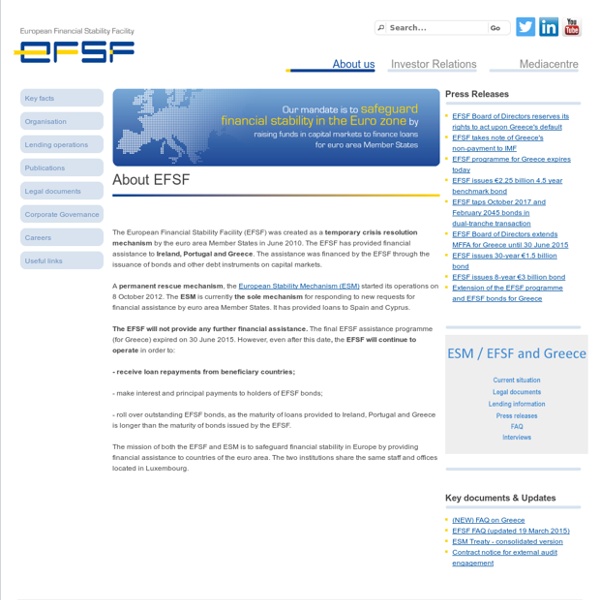



Site d'ANDRE ARMAND. Economie Collateralized Debt Obligations News Banks' Suit Tests Limits of Resisting Volcker Rule By MATTHEW GOLDSTEIN and PETER EAVIS Banks are testing the legal climate by challenging an obscure provision of the Volcker Rule that affects mostly small banks, for relatively small amounts of money. December 24, 2013, Tuesday Banking Group Threatens Lawsuit Over Volcker Rule By MATTHEW GOLDSTEIN The American Bankers Association, an industry trade group, is threatening to take regulators to court over how the Volcker Rule would affect community banks. December 23, 2013, Monday Volcker Rule Quickly Hits Utah Bank Zions Bancorporation says it is taking a charge of $387 million to rid itself of a sizable portfolio of trust-preferred collateralized debt obligations and other C.D.O.’s. December 16, 2013, Monday Bank of America to Pay $131.8 Million Penalty in Mortgage Deals The settlement stems from a S.E.C. inquiry into two complex mortgage securities that the bank’s Merrill Lynch division sold before the financial crisis. December 12, 2013, Thursday
Euro Rescue Fund Faces Political Demands Related German GDP, Economy, Consumption, Labor Market Europe’s rescue fund faces political demands that risk hobbling its response to emergencies as the 17 euro-area governments prepare to ratify its overhaul. The fund, known as European Financial Stability Facility, would have to wait for a request from a debt-hit government before buying its bonds in the secondary market, its new statute shows. The extra step, along with German lawmakers’ demand for control, may make it less responsive than the European Central Bank, which has bought 115.5 billion euros ($167 billion) of bonds in the past 16 months to calm markets. “What’s clear is that even if the EFSF is ostensibly equipped to react swiftly in an emergency, it will be much less dynamic than the ECB,” said Daniela Schwarzer, senior analyst at the Berlin-based German Institute for International Politics and Security. ‘Acting With Unanimity’ The overhauled fund will wield 440 billion euros. Collateral Demands German Debate Sweeping Control
5.2. Un risque de déflation ou une déflation du risque ? "Il n'est pour une économie pire danger que l'inflation, à l'exclusion toutefois de la déflation"Jacques Rueff Lorsqu'ils entendent parler d'un risque de déflation, l'économiste et le banquier central perdent soudain leur flegme et leur sens de l'humour. Ils sont instruits par l'expérience de la crise des années 1930 et, dans une moindre mesure, de celle des années 1990 au Japon que, lorsqu'une spirale déflationniste s'enclenche (baisse généralisée et auto-entretenue de tous les prix susceptibles de freiner la demande de biens), la politique monétaire peut perdre toute son efficacité. Les crises déflationnistes dégénèrent alors en dépression, cette dernière notion pouvant s'analyser comme une récession que les autorités n'ont pas les moyens d'arrêter. Décrivons brièvement le mécanisme à l'œuvre : 2/ Cette baisse ne stimule pas la demande, comme dans le modèle traditionnel de rééquilibrage concurrentiel, du fait de la rigidité des taux d'intérêt nominaux.
Glass-Steagall Act (1933) News Adapted from an article in the Law Library. The Glass-Steagall Act, also known as the Banking Act of 1933 (48 Stat. 162), was passed by Congress in 1933 and prohibits commercial banks from engaging in the investment business. It was enacted as an emergency response to the failure of nearly 5,000 banks during the Great Depression. The act was originally part of President Franklin D. Roosevelt’s New Deal program and became a permanent measure in 1945. Beginning in the 1900s, commercial banks established security affiliates that floated bond issues and underwrote corporate stock issues. As a result of the bank closings and the already devastated economy, public confidence in the U.S. financial structure was low. Investment banking consists mostly of securities underwriting and related activities; making a market in securities; and setting up corporate mergers, acquisitions, and restructuring.
Executive Board E.C.B. Members of the Executive Board February 2014 Terms of office – past and present The Executive Board consists of the President Vice-President and four other members All members are appointed by the European Council, acting by a qualified majority. Responsibilities to prepare Governing Council meetings; to implement monetary policy for the euro area in accordance with the guidelines specified and decisions taken by the Governing Council. Members Click on a photo to enlarge Share +
Les décodeurs | Fact-checking participatif, par le service politique du Monde Mr B1G - Jean-Claude Trichet - Wiki Jean-Claude Trichet (pronounced: [ʒɑ̃ klod tʁiʃɛ]; born 20 December 1942) is a French civil servant who was the president of the European Central Bank from 2003 to 2011. He is also a member of the Board of Directors of the Bank for International Settlements. In 2008, Trichet ranked fifth on Newsweek’s list of the world's most powerful along with economic triumvirs Ben Bernanke (fourth) and Masaaki Shirakawa (sixth).[1] Biography[edit] Born in Lyon, France of a Jewish[citation needed] family, Trichet was educated at the École des Mines de Nancy, from which he graduated in 1964. He later trained at the Institut d'études politiques de Paris (best known as Sciences Po), finishing in 1966, and the École nationale d'administration (ENA) from 1969–1971, two French higher education institutions in the field of political science and state administration. In 1987 Trichet became a member of an influential Washington-based financial advisory body, the Group of Thirty. Banking scandal[edit]